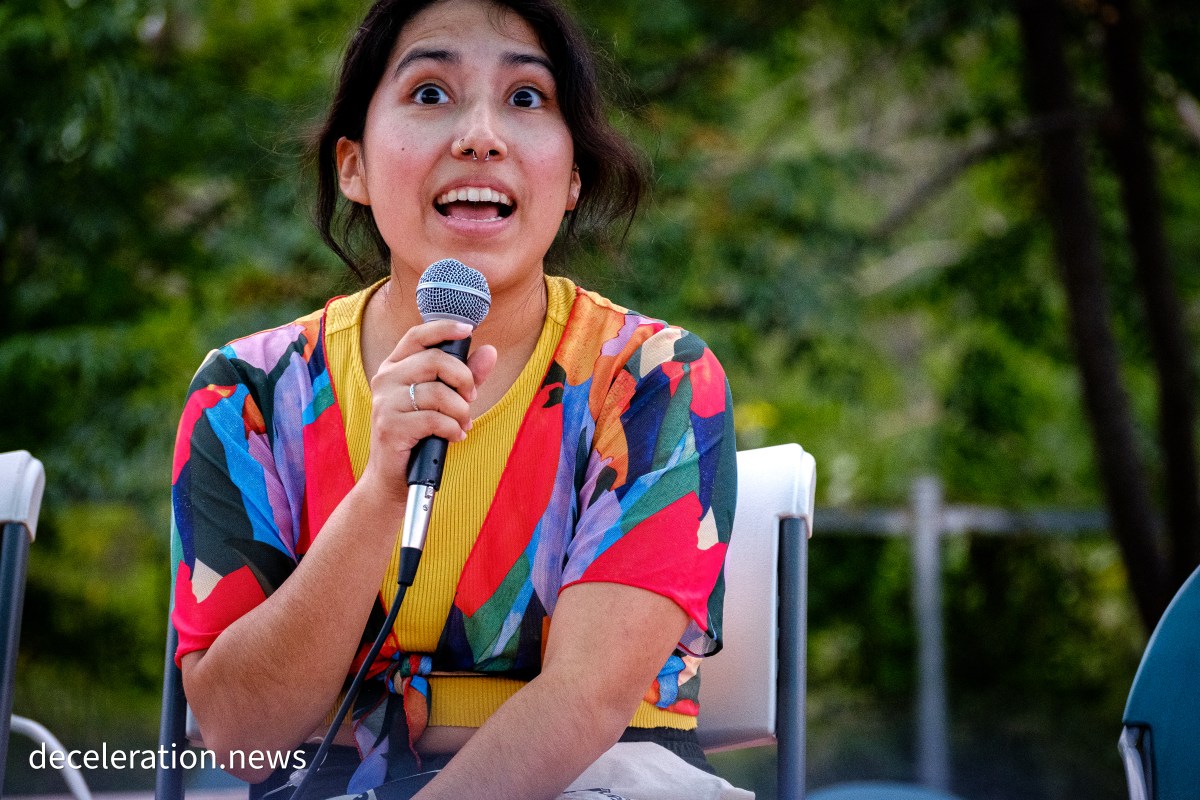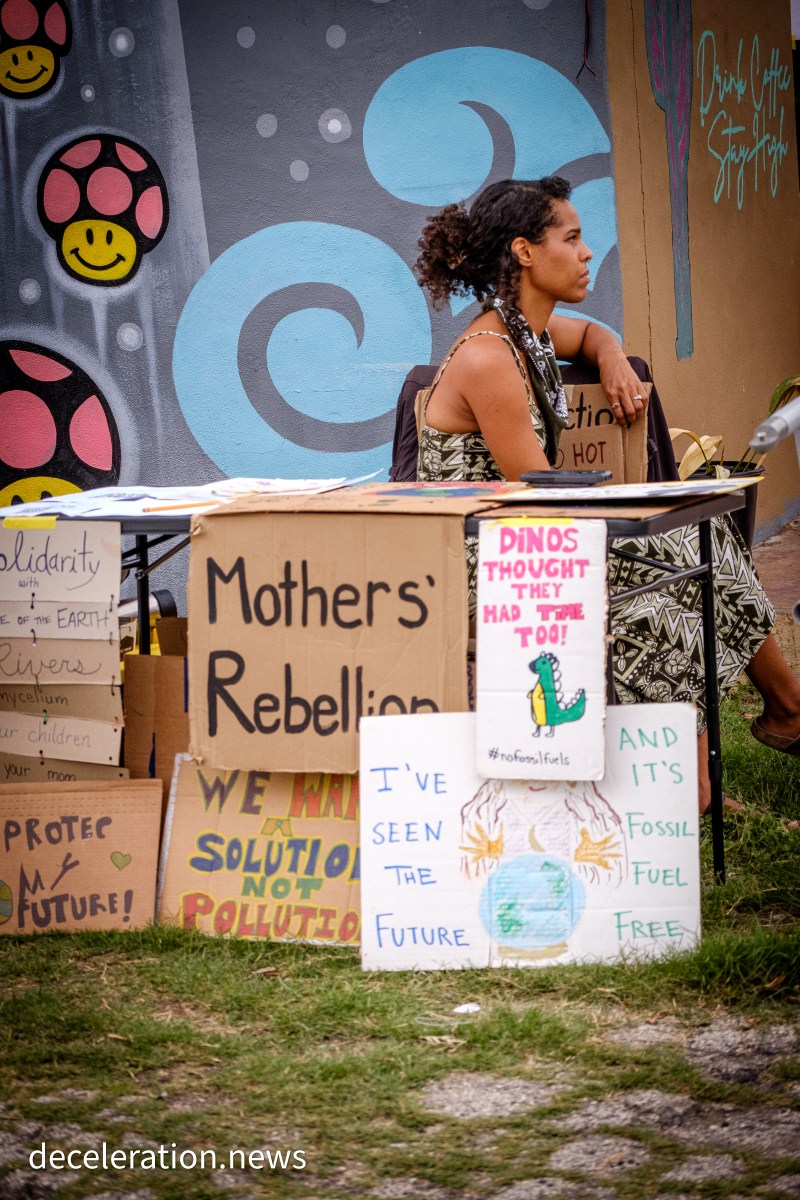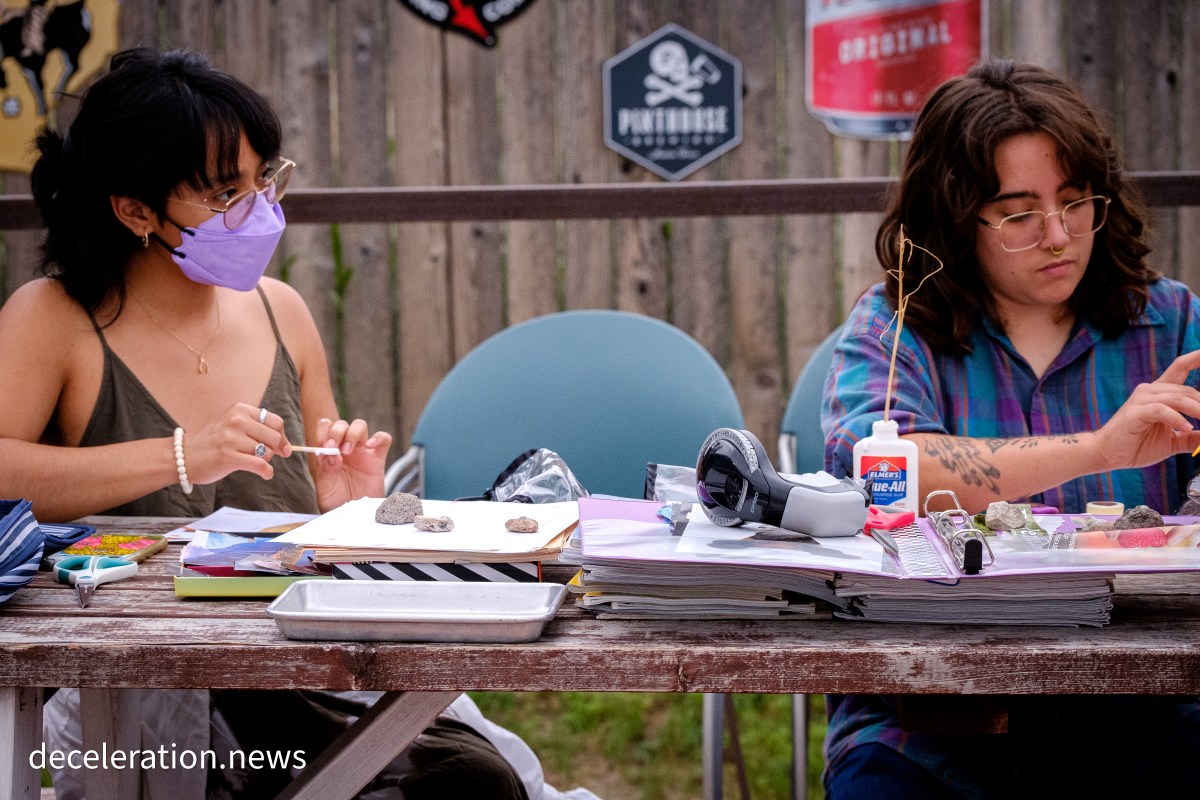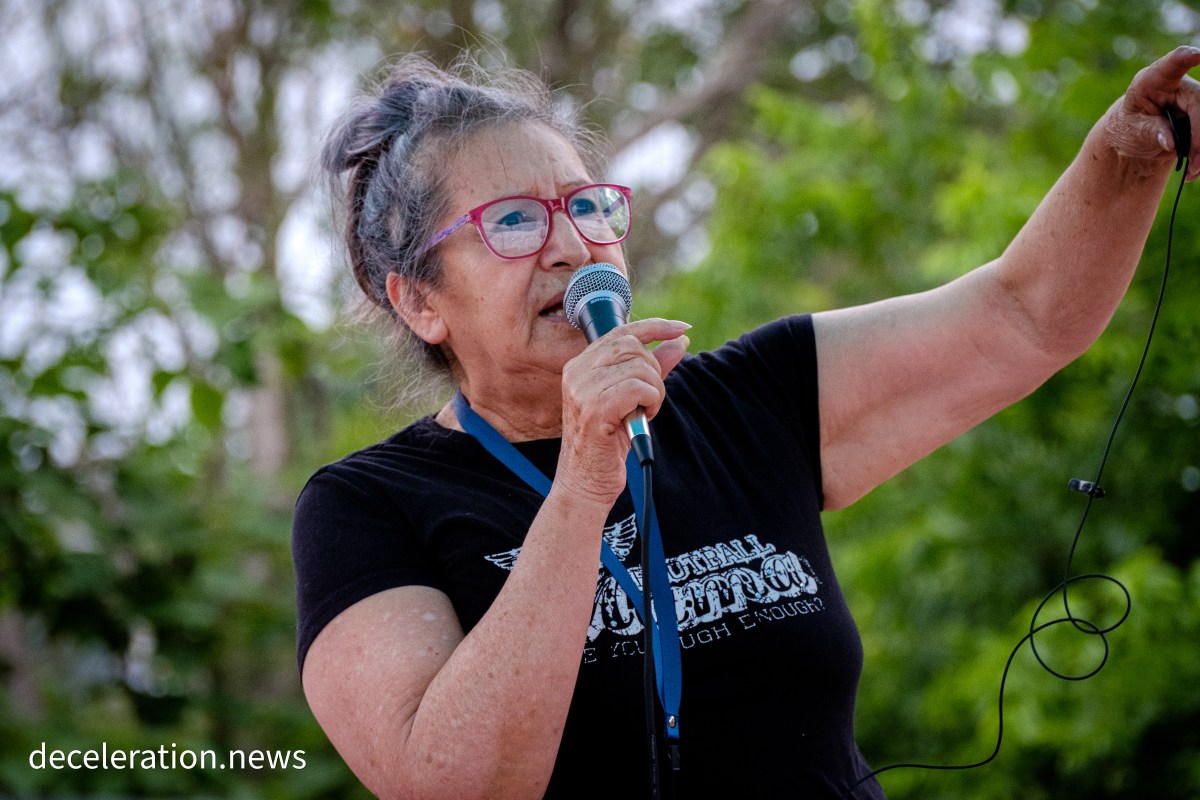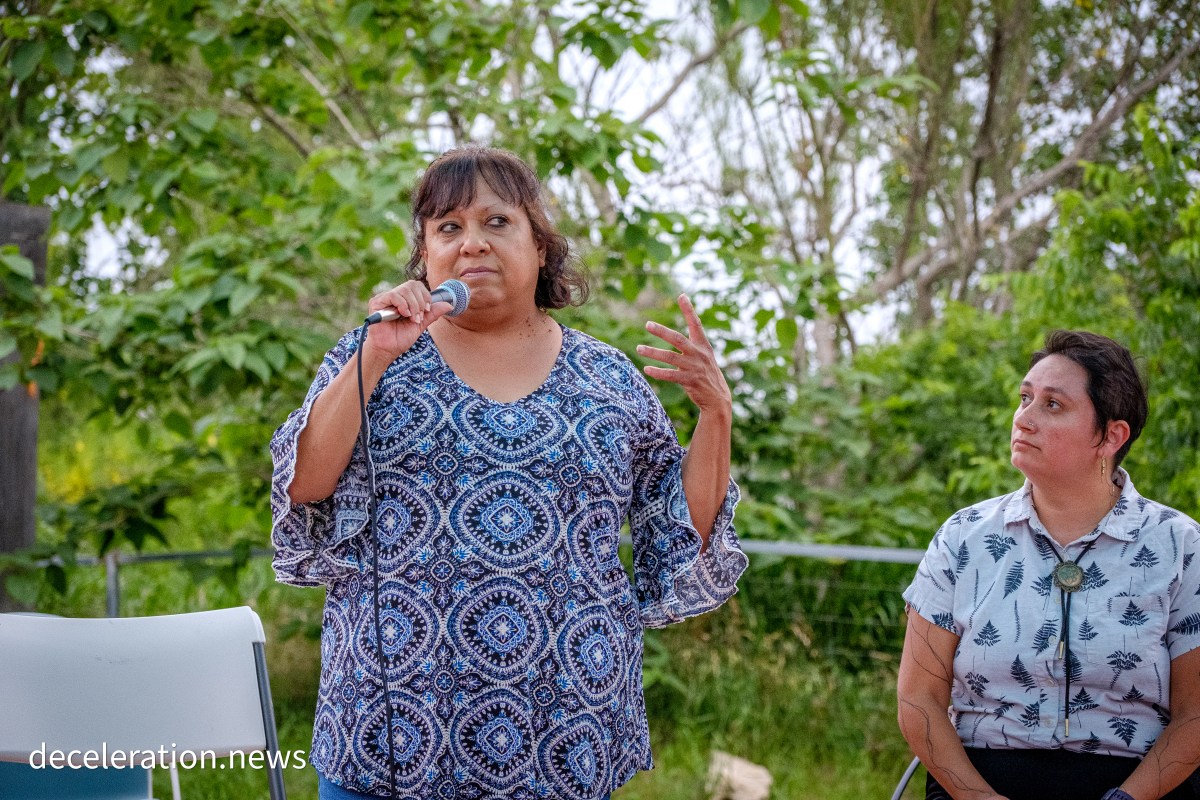Leer esta página en: Español

Public health experts and community workers convened this week at Deceleration’s ‘Heat Emergency’ to connect the dots between extreme heat’s causes, local impacts, and how best to interrupt the gathering crisis and (hopefully) save some lives.
Greg Harman
At least 28 people died in Bexar County between 2019 and 2023 from exposure to extreme heat, according to data provided to Deceleration last week by the Texas Department of State Health Services. This is almost certainly an under count. The head of a local homelessness outreach that maintains an annual list of deaths among their unhoused clients suspects that unprecedented heat in 2023 may have killed more than 60 on San Antonio streets and contributed to the deaths of dozens more during the same year. Yet the San Antonio Metropolitan Health District, which releases heat-related health statistics every month for most of the year, has reported only a single heat-related death since 2018. Meanwhile, the Bexar County Medical Examiner told Deceleration that they typically don’t list heat as a cause of death (or even a contributing factor) on death certificates because they don’t believe the data being collected by first responders is good enough to make that determination.
We don’t know who or even how many people are being killed by extreme heat in San Antonio and Bexar County. That fact—especially considering the global climate crisis pushing temperatures into uncharted territory—represents a severe violation of trust.
Last year shattered all preexisting heat records. It was the hottest year on planet Earth in 125,000 years thanks to the heat being generated “primarily” by burning fossil fuels, according to NASA and NOAA. This uncomfortable truth regularly slips the mind of those at Hearst Newspapers who are tasked with explaining this life-threatening weather to the public. The last 10 years all rank among the hottest 10 years ever recorded. And until we shift away from fossil fuel use, national and international researchers and agencies, including the World Meteorological Association, tell us that those local and global temperatures are virtually certain to continue to rise.
As anyone in the public health field knows, to even begin to keep people safe, it is critical to first know who is being impacted—and how. Only then can we develop a sweeping, inclusive, and truly proactive responses to this industrial overheating.
To put it crudely: We need to count the bodies.
It isn’t happening.
SIGN THE PETITION: Extreme Heat is Killing Us. We Demand a Better Medical Response.
This week, dozens of concerned and engaged local residents gathered at Tandem on San Antonio’s Southside to hear from heat-informed panelists and discuss and refine collective heat responses even as we prepare for another wave of extreme heat to manifest in Texas.
Panelists included:
- Rose Jones, Medical Anthropologist
- Lotus Rios, Harlandale Sunshine Pantry
- Adelita Cantu, UTHSC-SA, Alliance of Nurses for Healthy Environments
Adelita Cantu, a nationally recognized community health expert based at the University of Texas Health Science Center at San Antonio, helped attendees understand the various ways heat impacts the body and the many inequities built into the public health system.
Most people don’t truly grasp how dangerous heat is, Cantu said Wednesday night.
“You want to sweat, because sweat cools the body. However, many times it can’t keep up with the increase in temperatures or heat index,” Cantu said.
“So you’re even more at risk from what we call heat exposure. And you start feeling the headaches, the nausea, and the dizziness that comes with it. And it’s a quick trajectory to what we call heat stroke, where this could be a life-threatening condition.”
RELATED: Extreme Heat Survival Guide: A (Bilingual) Deceleration Resource Project
Rose Jones, a Dallas-based medical anthropologist working at the intersection of “extreme heat, public health, and human rights,” focused her comments on heat as a “humanitarian crisis.” She highlighted how heat is increasingly used by some in power to punish particular demographics—including the incarcerated, immigrants, and union organizers.
“Heat is now the staging grounds for the violation of basic human rights and the most vulnerable and marginalized groups are the collateral,” Rose Jones told Deceleration in a recent podcast.
“From construction workers to the incarcerated, the unhomed to migrants along the U.S.-Mexico Border, extreme heat is a crisis of humanity and I can no longer stand on the sidelines.”







On Wednesday, she added:
“The state of Texas requires animal facilities to have a minimum of 86 degree Fahrenheit. Do you know what the cells look like throughout the state of Texas? The stories I heard, and what I saw, was unfathomable. If it’s 110 outside guess what it looks like in a cell with no air conditioning and no ventilation?
“We all talk about in the media the temperature, [that] we were breaking temperature records all last summer. We were breaking more than that. They were human lives.”
Lotus Rios, who operates the Harlandale Sunshine Pantry on San Antonio’s Southside, reflected on her own efforts to respond to the needs of her neighbors—placing the blame for many lives lost back on inadequate and unjust governmental responses while urging people to take action on their blocks.
“We need to do something. We need to get the information out there,” Rios said.
“Check on people. Go out there. Go to the houses that nobody goes by. Say, ‘Hey, do you have enough water? Do you have enough food? Do you know where to get this?’ Because I bet they don’t.”
Attendees who joined in the Community Circle after the panelists spoke showed concern for the broader urban ecology—trees, birds, and other related species—as a critical climate response. It was, as Jones summarized at the close of the meeting, a natural impulse to make what public health professionals have come to term “One Health” strategies central to local heat efforts.
Heat Emergency Slideshow
One Health draws on long histories of holistic Indigenous cosmologies common around the world and is defined by the US Centers for Disease Control as “an approach that recognizes that the health of people is closely connected to the health of animals and our shared environment.”
Organizations and agencies tabling the event included SAMMMinistries, Southwest Workers Union, CPS Energy, Mother’s Rebellion, DSA-San Antonio, Mootual Aid SA, Sueños Sin Fronteras, Esperanza Peace & Justice Center, Protect Yanaguana Grandfather Trees and Migratory Birds, San Antonio Metropolitan Health District, among others.
Deceleration launched a “Count the Bodies!” petition this week calling on the Bexar County Commissioners and San Antonio City Council to “instruct the Medical Examiner and Metro Health to immediately convene and develop a response involving frontline EMS personnel” to accurately account for the impact of heat on residents.
As Jones says: “If you are not counting it accurately, you are not addressing it.”
More Heat Emergency meetings are planned.
Sign up for our weekly Deceleration In Depth and monthly Regeneration newsletters for updates. Write editor@deceleration.news to suggest topics and speakers for future gatherings.
-30-

Like What You’re Seeing? Become a patron for as little as $1 per month. Explore ways to support our mission. Sign up for our newsletter (for nothing!). Subscribe to our podcast at iTunes. Share this story with others.

